Excerpt: Lifestyle change is hard but it doesn’t have to be confusing. Read our 16 Leo Babauta quotes from Essential Zen Habits to find out more.
Click Here to jump right to our list of quotes from Essential Zen Habits!
Introduction: Be Water, My Friend.
In his book, Essential Zen Habits, Leo Babauta shares a mental analogy that can help you stay on track towards accomplishing your goals—or better yet, not stay on “track” at all yet continue heading in the direction of your goals in a more flexible, effective manner. You see, for many people, the idea of a plan gets equated to mental “train tracks” that get laid out so that you, the train, can power forward in a smooth, straight line down the track towards your destination.
In theory, this sounds good, right? You think into the future and come up with the ideal route based on the information you have and you lay metaphorical tracks out that will take you there in the fastest, most efficient way possible. The only problem, of course, is that even if you come up with the most researched, well thought out plan, life will still get in the way and disrupt your path. And when it does, your tracks will dismember and your train will derail and crash. Sound familiar?
What might be a better mental framework to follow then? Be water, my friend. Just as Bruce Lee discussed being “formless” and “shapeless” like water when it came to mental flexibility and combat success, the same should be true for how you approach goal achievement. Rather than imagining yourself powering forward down a train track, imagine yourself flowing like a small river down a mountain.
When the water from a river confronts a rock or a tree does it derail and crash? No. The water flows around the rock or the tree (or any obstacle for that matter) as though it had planned that route all along—and it keeps on flowing towards its destination smoothly. This is the power of staying flexible in your approach whenever you’re pursuing any goal or achievement. Because as appealing as a smooth ride down beautifully laid train tracks might sound, the reality is, your path to personal success is going to look a lot more like the chaos of the side of a mountain. And if we’re not flexible in our approach, we will crash.
NEW In The Shop: Don’t Let The Tame Ones Tell You How To Live [Poster]
Why We ♥ It: Some of the best advice I (Matt here) ever got was: don’t take life advice from people who aren’t living a life you want to live and don’t take criticism from people you wouldn’t go to for advice. I created this poster to act as a reminder to listen more closely to our role models and less closely to our critics, trolls, and tamed-comfort-zone-hugger acquaintances. It’s also a perfect gift for the outdoor adventurer, travel enthusiast, or solo explorer (or soon to be). Available in print or digital download. 👇🏼
...Want to advertise your book, product, or service? Send inquiries to matt@movemequotes.com.
How might we apply this in our lives? I’ll give you a recent, personal example. For exercise, one of my main goals is to complete four weight lifting sessions and two deep stretching sessions at a bare minimum every week. I find that getting these workouts done first thing in the morning is ideal for me and is the easiest way for me to get the job done week-to-week. But, sometimes life gets in the way. I do my best to block out my time so that this doesn’t happen, but life always finds a way to mess that up every now and again. Sometimes I have to go into work earlier, or meet up with a friend, or go to a scheduled appointment, or sometimes I just feel really out of it.
Rather than crash and burn my whole train of momentum, I stay flexible in my approach and adjust as though that was the plan all along. I move a morning workout to the afternoon; or I double up workouts the next day; or I swap an “off” day with a workout day. This morning, for example, I did my Friday leg workout that I missed (because of a lack of sleep), plus my Sunday flexibility session in one—and I’m back around that obstacle moving smoothly down my mountain.
Some tips to keep in mind as you’re flowing into obstacles and challenges: First, keep your destination clearly in mind—remember why you’re doing what you’re doing and keep your resolve firm. Exercise is an integral part of my life and the routine I have devised has evolved over two decades—my resolve to get my workouts done is firm and unwavering. Yours should be too.
Second, don’t let the destination occupy so much of your mind that you’re missing out on the view of the present—try to enjoy the little detours along the way. Witness the miracle of your body working for you and exercising freely in space. Feel the pump that comes to your muscles as you challenge them, the satisfying feeling of sweat as it drips down your face, the tension that gets released when you finish a stretching session—all of this will turn your detour into a delight.
Third, never miss two days in a row. If you need to cancel a workout or action step, make absolutely certain that you don’t miss it again the next day. Missing one day is a hiccup; missing two days is the start of a new habit.
Finally, take yourself seriously. If you say you’re going to do something—do it. Follow through. That being said, be careful with what you commit to! But once you commit, be committed. Because if you don’t take yourself seriously, why should you be able to accomplish any serious goals?
Once you adopt the mental analogy that your path to personal success will look a lot more like the chaos of the side of a mountain than smooth, beautifully laid train tracks, then you’re ready to begin. This means, though, that the path that’s about to follow is going to be filled with challenges and obstacles and trees and rocks.
Saying that you’re just going to be water and that you’re going to smoothly flow around obstacles and challenges like it was a part of the plan the whole time sounds effortless in theory, but in reality it’s choppy, you crash, you twist, you submerge, and you sometimes only barely make it out to the other side afloat. And so is life, right?
But what the path doesn’t have to be is confusing. It might be hard, but at least you can be clear about what’s going on. This is where Babauta does a great job in his book. He lays out clear and easy to understand ideas, strategies, and mental analogies that can help you learn how to be more like water in real life.
Below, you will find 16 of my favorite Leo Babauta quotes from Essential Zen Habits that will shine light on just that. And with practice, you’ll go from smoothly flowing around obstacles with conscious, precise effort to doing it habitually and without even so much as a thought. I hope they find you well and I hope they help you do exactly what Babauta intended them to do: master the art of change and better your life. Good luck!
The List: 16 Leo Babauta Quotes from Essential Zen Habits and How To Master the Art of Change
“Remember the truth about the mind when it comes to change: it’s a little child. Imagine that your brain is a child that wants pleasure and wants to get what it wants, and it really wants to get out of discomfort. This Childish Mind will do everything it can to get out of discomfort. It will make you run from exercise, from doing difficult tasks, from new and confusing things. The Childish Mind will make excuses, rationalizations, beg to quit. It’s very, very good at what it does, and it’s constantly working against our best intentions. I learned how to overcome this Childish Mind Syndrome: I made my running habit ridiculously easy. I told myself all I had to do was go out and run for a few minutes. My Childish Mind couldn’t object to that, because it was so easy! And when you make your habit change easy, I’ve learned, the Childish Mind actually doesn’t work against you in the beginning.”
Leo Babauta, Essential Zen Habits (Page 18)
“Why quit cigarettes or all those sweets you’ve been eating? Isn’t life short and meant to be enjoyed? Don’t you deserve a treat? Yes, these are the justifications I gave myself too. And they’re a load of bull. Life is short, so why waste it on pure junk? Those things don’t make you happy—if anything, they made me less and less happy about myself. I’ve been happier once I gave up those habits and learned to be healthy and trustworthy to myself. Eating healthy food is a treat. Living smoke-free is pure bliss. But the biggest reason to change is that you love yourself. You don’t need to harm yourself to find happiness and contentment. Taking care of yourself is a form of self-compassion, and the sooner you start, the sooner you’ll feel good about how you’re loving yourself.”
Leo Babauta, Essential Zen Habits (Page 148)
“You don’t control the results of growing a plant—it will grow however it grows, because we don’t have god-like powers that can control how a plant will grow. You don’t control the outcome, but you do control the inputs. You can water it, give it more sunlight, feed it some nutrients, give it good soil, make sure bugs aren’t eating it. You control the inputs and environment, but not the outcome. So Grow a Plant when you’re making changes: you don’t control the outcome, so you can’t get fixated on it. Don’t attach too tightly to the results of a change. Instead, focus on creating a good environment. Focus mostly on the inputs: what are you bringing to the change? What is your intention? What is your effort? What is your enjoyment and mindfulness? If you do this with weight loss, then you don’t focus on the weight loss itself. You focus on the input: what kind of food are you eating? Are you eating mindfully? Do you have a compassionate intention when it comes to your eating? Are you exercising mindfully? Are you giving yourself a good environment to support these changes? If you focus on the inputs, you don’t know what the plant of your weight loss change will result in. Maybe it will mean a slimmer version of you, maybe a healthier one, maybe a stronger one with more muscle. You don’t know exactly, because you can’t sculpt your body like clay. What you can do is water it, give it sunlight and good nutrients, and see how it grows.”
Leo Babauta, Essential Zen Habits (Page 57)
“The bad habits we’ve formed are often useful to us because they help us deal with stress and boredom. Consider some of the bad habits that fit this bill: smoking, procrastination by browsing the Internet, eating junk food, drinking, addiction to TV or video games, compulsive shopping, biting nails. All of these habits fill a strong need: they are ways to cope with stress and/ or boredom. We have formed them as coping mechanisms, and they stick around because we don’t have better ways of coping. So if we replace them with healthier ways of coping, we get rid of the problems of these bad habits, and start getting the benefits of better habits.”
Leo Babauta, Essential Zen Habits (Page 152)
“What’s the typical feedback loop for someone who doesn’t exercise much? When she does the exercise, she gets discomfort, sweatiness, tiredness, maybe even soreness. That’s negative feedback for doing the exercise. Not doing the exercise is much more comfortable, because she’s on the Internet doing easy, mildly pleasurable tasks. That’s positive feedback for not doing the exercise. The combination of these two feedback loops is why—at first—it’s so hard to form the exercise habit. People are up against much more than they realize, because no amount of willpower can overcome a setup of feedback loops that go against the behavior they’re trying to create. And it works like that for every single habit: eating junk food and shopping and playing games are easy habits to create and hard to break, while exercise and mediation and eating vegetables and learning languages are much harder. All because of the feedback loops. So what are we to do? Reverse the feedback loops to get the behavior we want. We want positive feedback for the habit we’re creating: rewards, praise, physical pleasure, spending time with a friend, getting stars on a chart, continuing a streak, a feeling of accomplishment, enjoying the activity with a smile. We want negative feedback for not doing the habit: embarrassment of people knowing you didn’t do it, losing a bet, enduring some embarrassing consequence, losing the streak you’ve created, experiencing some kind of difficulty or loss. Grease the slope. Create public accountability. Set up rewards and consequences. The smarter you’ve set up your feedback loops, the better you’ll be at doing the habit.”
Leo Babauta, Essential Zen Habits (Page 42)
“If you plunge into really cold water, you’ll be shocked, and you’ll hate it. But if you go into water that’s only a little colder than room temperature, it won’t seem too bad. After awhile, it’ll feel pretty normal. Then if the water’s temperature drops a little more, it won’t seem too bad, and soon that will become normal. You adjust. When it comes to changing your life, don’t plunge into the freezing water. You’ll soon get out of the water and be afraid of going in again. Instead, take a dip in slightly cool water. Make a very small change. Adapt to that, then make another. Gradually, through a series of small changes, you’ll see amazing progress.”
Leo Babauta, Essential Zen Habits (Page 126)
“Imagine yourself as a kid who wakes up after a night of heavy snowfall. There’s a thick layer of snow on the ground, clean and without a path. The first time you walk through this snow, you have a very wide array of choices for what path to take. You can walk to the left, down the middle, to the right, zig zag, walk over that hill, and so on. Not only do you have many choices of paths to take, but each one will be very difficult, because there’s a foot of snow everywhere. Now picture walking to school the next day …the snow from the previous day is still there, but now there’s a bit of a path you created from yesterday’s walk. You can still create a new path, but the one you created yesterday will be a bit easier. So you take that one. Each day, you decide to take the path already created. This is a groove in the snow that gets easier over time, until you’re probably not going to take any other path. Creating a new habit is a lot like that: you’re creating a groove in the snow. At first, you can go anywhere, and it’s difficult going …but once you’ve created a groove, it’s much easier, and you don’t have to forget new paths anymore.”
Leo Babauta, Essential Zen Habits (Page 28)
“When we procrastinate, it’s because we have an urge to run from the difficult, uncomfortable task. We don’t want to do the hard work, or be in confusion, or fail at something, so we get the urge to run. It stems from the fear of failure, of not being good enough. The urge comes up, and we follow it! But we don’t need to follow it. We can watch the urge to procrastinate, like a cloud, but not act on it. We can just let it float by, and get to work. Let the cloud float away, because it doesn’t control you. The cloud isn’t you. It’s just a passing phenomenon, one that arises and floats away.”
Leo Babauta, Essential Zen Habits (Page 87)
“Never let your mood determine whether you should do something or not. Mood is a bad indicator of the worthiness of any activity.”
Leo Babauta, Essential Zen Habits (Page 80)
“Resistance can be overcome by doing the smallest possible step. For meditation, I just had to get my butt on the cushion. For writing, I just had to open up a document and write a few words. For cooking healthy food, I just had to get out a knife and an onion. For studying a language, I just had to press ‘play’ on the audio lesson. For yoga, I just had to get into child’s pose. For blogging, I just had to open up the form for writing a new post. For flossing, I just had to floss one tooth. For reading, I just had to open up the book and read a sentence. I think you get the point. Find the minimum viable habit. The smallest increment of doing the activity. The least objectionable version. And the resistance is overcome.”
Leo Babauta, Essential Zen Habits (Page 80)
“Imagine that your life and your attention are a small room, and in this room you wanted to put a meditation cushion, a weight set for exercise, a kitchen for healthy eating, a couch for reading, a writing desk for creating a novel, a yoga mat for doing some yoga, and a tea table for mindfully drinking tea. The tiny room would be cramped, and none of these things would have any space, and we’d not really be able to do any of them. This is what happens when we try to do multiple habits at once: we overfill the small space of our lives and our attention so that we have no room for anything. Instead, imagine that we only had one thing in that room—let’s say the writing desk. That’s all that’s in the room for the moment. This desk would have space, and the writing would get our full attention. Create space for your habit change, by doing one habit at a time, and you’ll do your best job on that habit.”
Leo Babauta, Essential Zen Habits (Page 16)
“Use mistakes as feedback. They’re not signs that you’re a bad person or have no discipline. They’re signs that you need to adjust.”
Leo Babauta, Essential Zen Habits (Page 71)
“Self-reflection has turned out to be one of my most powerful tools in changing my life. It becomes a mirror that helps you see what’s going on in your life, that keeps you from making the same mistakes over and over again, from being on autopilot and failing to course-correct. Having a blog with readers is like having a journal on steroids—it forces you to reflect on what you’re doing in your life, because if you’re going to share what you’re learning with other people, you first have to reflect on what you’ve learned.”
Leo Babauta, Essential Zen Habits (Page 50)
“All my attempts to control things should be abandoned, and I should just accept the ever changing, ever flowing nature of my life as a river. It turns out that this model can bring me peace no matter where I am, no matter what’s happening. If plans get disrupted, my day gets interrupted by a sudden crisis, information starts coming at me from everywhere, the pace of events starts quickening… I just picture myself as a river, with all of this stuff flowing through me. I don’t try to hold it, control it, freeze it, but I embrace the flow. I smile, I breathe, and I focus on one thing. Then the next. Not holding tightly to any of them, or wanting the river to be any certain way.”
Leo Babauta, Essential Zen Habits (Page 120)
“It’s the nature of dealing with other people that we all get frustrated and angry from time to time. We take offense at the other person’s actions. But the other person’s actions aren’t the problem—it’s our attachment to the ideal we have of how they should behave, which of course is unrealistic, and the real problem is the Childish Mind wanting so badly for that ideal to be true.”
Leo Babauta, Essential Zen Habits (Page 188)
“In the end, after letting go of my ideals of perfection, after letting go of my striving for goals, after wanting things to be a certain way… what am I left with? I’m left with Love. This feeling of boudless love, not for one specific person and not even limited to human beings, can motivate me to get up in the morning and write. It motivates me to be vegan, because my love extends to animals. It motivates me to work out, because my love extends to me, and to my kids for whom I’m setting this example of an active lifestyle. It motivates me to let go of attachments that lead to frustrations, because why fight with someone you love? Love can move you to be mindful, to appreciate the reality of this current moment, to appreciate and embrace impermanence as something beautiful, to be grateful, to make the most of this dewlike life. Love can move you to overcome struggles. Love can transform bitterness into softness, anger into kindness, self-hatred into self-compassion. Love is both the path, and the mover.”
Leo Babauta, Essential Zen Habits (Page 204)
Leo Babauta Picture Quotes to Share:
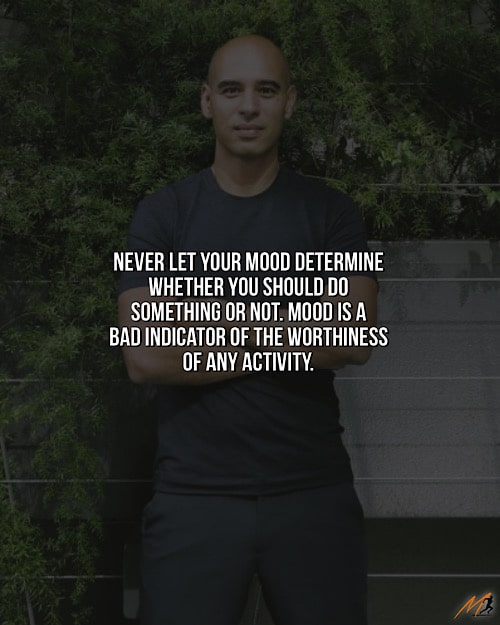
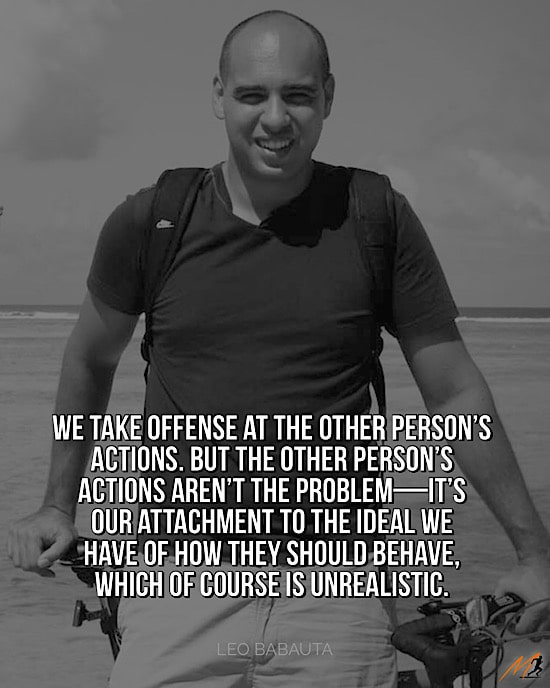
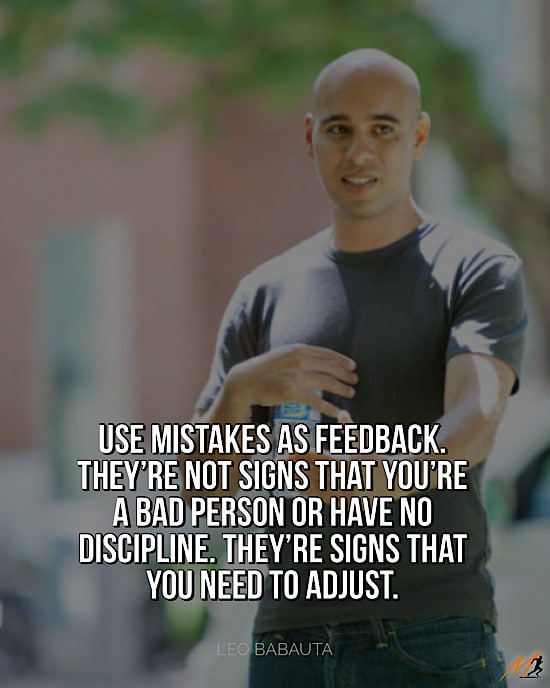
If you enjoyed these Leo Babauta quotes and want to read deeper into his strategies, ideas, and mental analogies, then you should definitely pick up a copy of this book. It comes warmly recommended:
Read Next:
NEW In The Shop: Don’t Let The Tame Ones Tell You How To Live [Poster]
Why We ♥ It: Some of the best advice I (Matt here) ever got was: don’t take life advice from people who aren’t living a life you want to live and don’t take criticism from people you wouldn’t go to for advice. I created this poster to act as a reminder to listen more closely to our role models and less closely to our critics, trolls, and tamed-comfort-zone-hugger acquaintances. It’s also a perfect gift for the outdoor adventurer, travel enthusiast, or solo explorer (or soon to be). Available in print or digital download. 👇🏼
...Want to advertise your book, product, or service? Send inquiries to matt@movemequotes.com.

Written by Matt Hogan
Founder of MoveMe Quotes. On a mission to help busy people do inner work—for better mental health; for healing; for personal growth. Find me on Twitter / IG / Medium. I also share daily insights here. 🌱
It has taken me 1,000’s of hours to build this free library for you. If it has helped you, you can support my continued effort here. ☕️
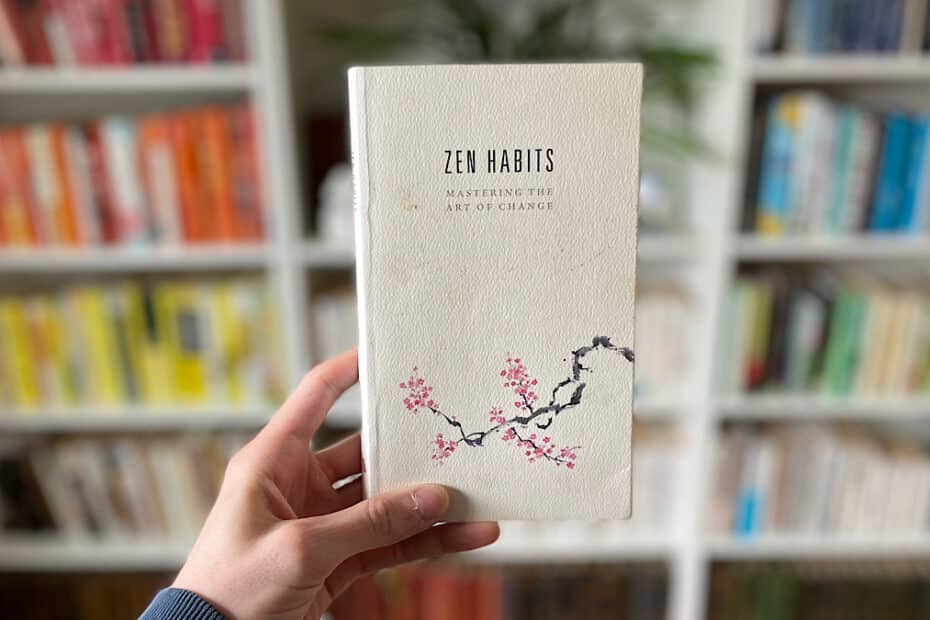
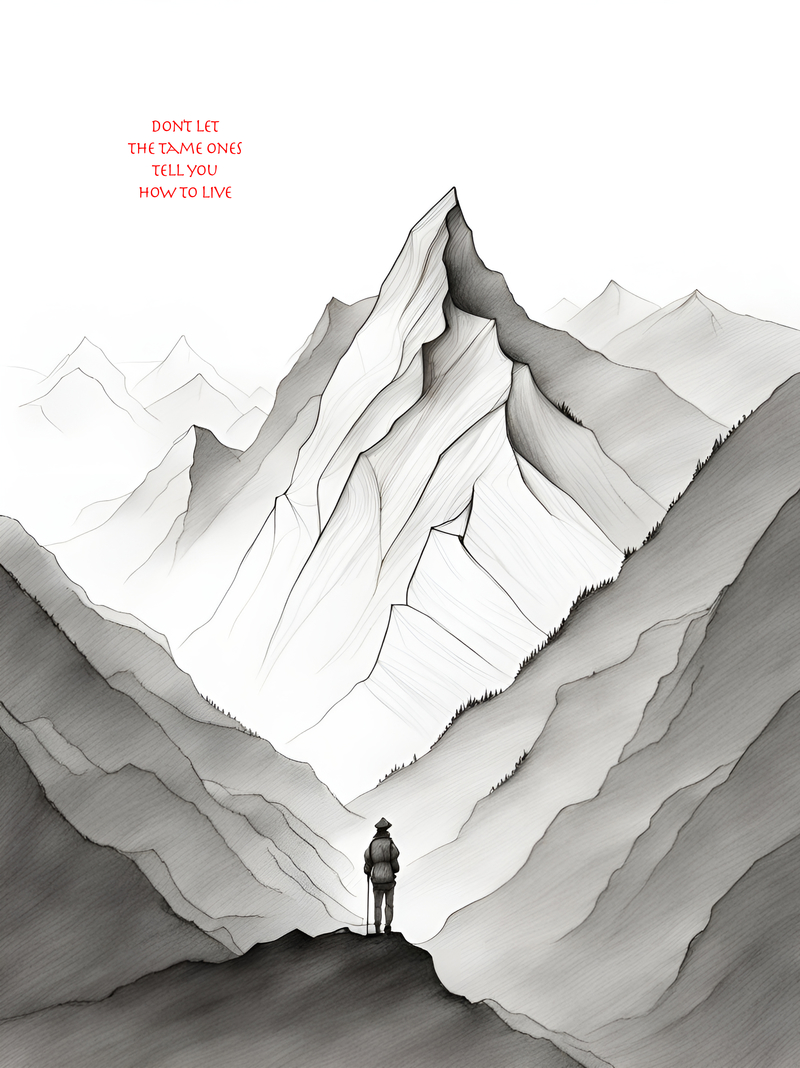
![Essential Zen Habits: Mastering the Art of Change, Briefly by Leo Babauta [Book] Essential Zen Habits: Mastering the Art of Change, Briefly by Leo Babauta [Book]](https://www.movemequotes.com/wp-content/uploads/2020/02/IMG_4400.jpg)
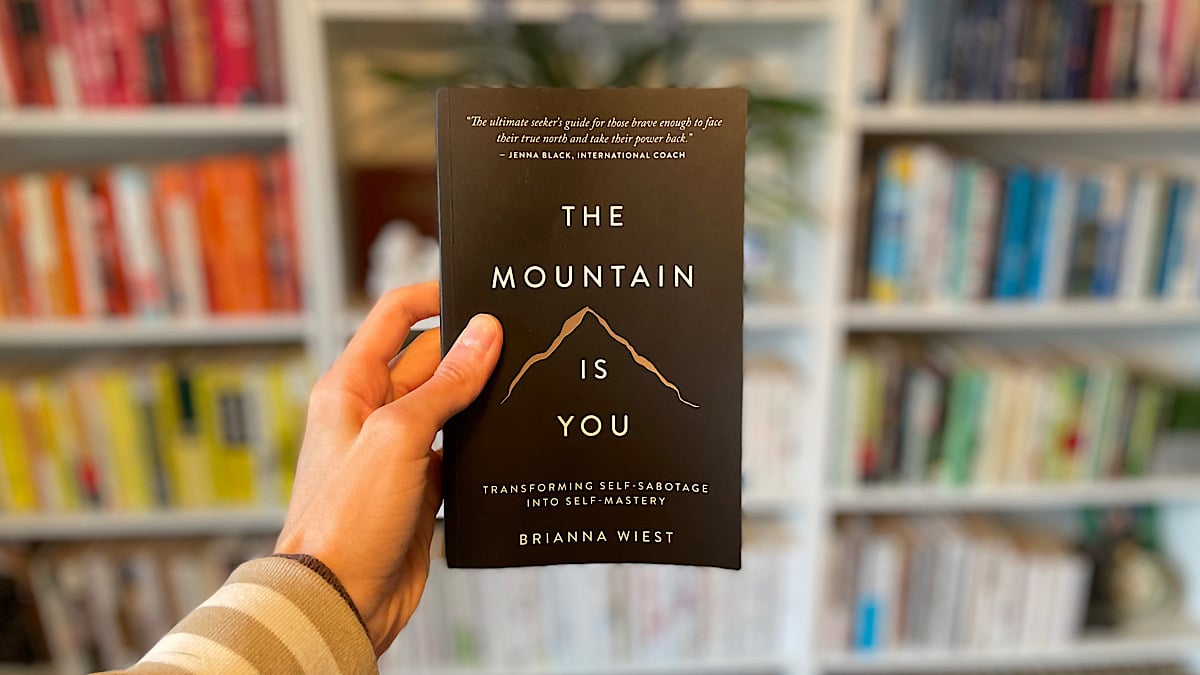
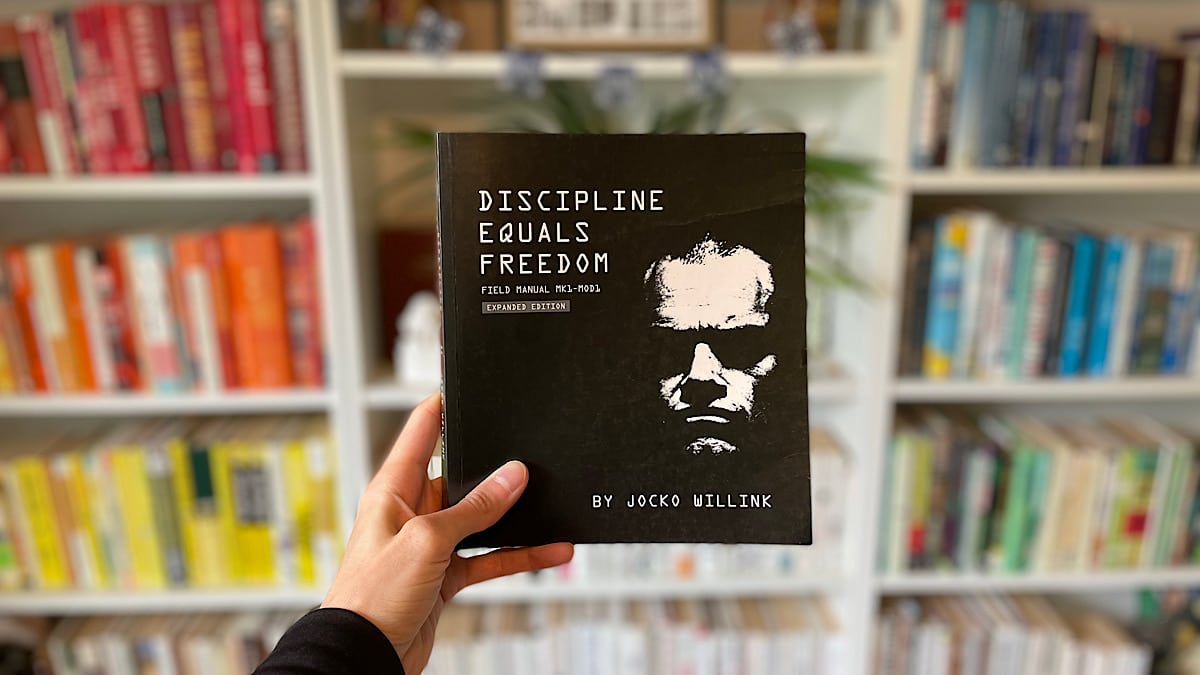

![10 Dream Discovering Questions For Women [Excerpt]](https://movemequotes.com/wp-content/uploads/2020/09/IMG_6952.jpg)
